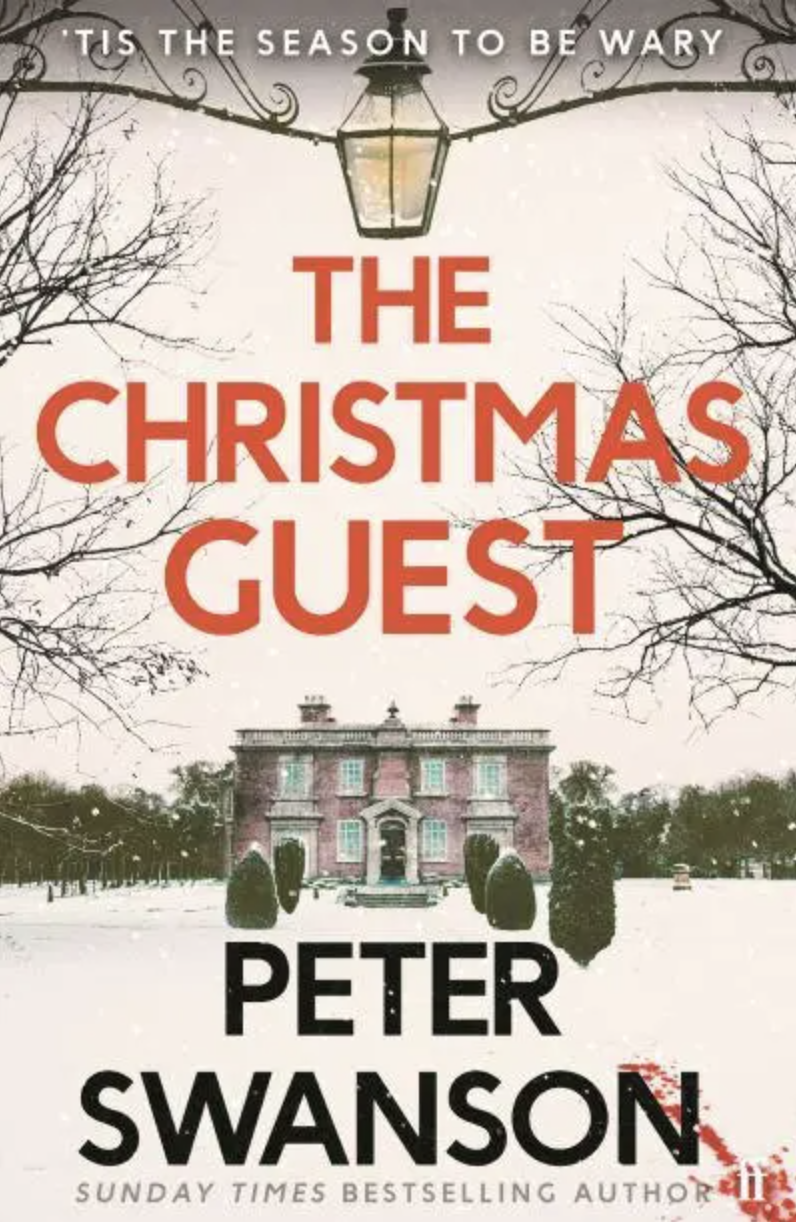The Christmas Guest, by Peter Swanson, reviewed by Luree Scott
The Christmas Guest by Peter Swanson is a novella that has many narrative twists and turns, as any good murder mystery should. You will get both the literal chills of the Christmas season, as well as a healthy dose of thrills—with plenty of ghosts, blood, and worst of all: supremely dysfunctional families coming together under one roof. It delightfully combines the gothic, supernatural aesthetic of Crimson Peak, mixed with the chipper coziness of Murder, She Wrote, which will certainly get any reader into a holiday mood.
Swanson pulls out all the trimmings with the structure of this story, dividing the book into two parts. The first is mostly epistolary, told through diary entries written by Ashley Smith, a young exchange student from America staying at an old British manor house for the holidays. Her narrative style is light, bubbly, and extremely campy, which only adds to the fun of this mystery. The reader is often left with many gaps in the timeline, being that Ashley takes time in between her entries to go out and live the story. She also has a habit of getting a little inebriated, so we often see entries that flow in this manner: “A little drunk now, to be honest with you. Night was magical and now I need to get under the covers because I’m SO tired and SO cold. Met the parents and they are SCARY. More later. Emma stuck by my side all night. So sweet!!” (13).
Swanson uses the imperfections of the diary format to illustrate the humanness of our main character, as well as provide an adequate sense of suspense that keeps the pages turning. There is something so charming about the way Ashley experiences the week of this chaotic Christmas unfolding around her. She’s hopeful, excited, and a bit nervous at all times, which is the perfect embodiment of the holiday season itself.
Now, because this first section is told from the diary perspective, there are many pages that use purely italicized text, which might take a minute for the eyes to adjust to. There is also a lack of dialogue quotations, many parentheticals, abbreviations of names (Ashley often calls Emma, the friend who invited her to the manor, E, for example), and even some scenes are told in a short, screenplay-like format. The sentence structure dips and dives just like the plotline, while still being simple and straightforward. It leans towards informal, even experimental. But this creates a neat sort of puzzle within itself that turns the mystery genre onto its head in a pleasant way.
The second half re-contextualizes the reason why this diary is being reread. This is where the mystery portion of the novella comes together in a surprisingly poignant way. Without spoiling the end, this is where the true emotional resonance of the story shines through. While the first part is a joyous and exciting romp through the English countryside (often seeming vapid, quirky, and sometimes cheesy), with a few strange happenings hinting at the death that is to come, the second part is a tale of grief, family trauma and loyalties, and the aftermath of Christmas’s past that leave you broken beyond repair. That’s what I admire so much about The Christmas Guest. It gives a bit of the magic and excitement of the season, while recognizing that this month can hold the most bitter and sorrowful memories for some. It is genre bending, cozy in essence, yet at the same time brutal. The murder itself is stunningly disturbing as well, so for the truest of thriller fans, this novella does indeed deliver.
The Chapman family is not the warm and jolly family you’d hope to spend the holidays with. They are full of perfectionists, masochists, and abusive dynamics that circle around each other endlessly. The family dinners showcase some of the tensest moments, as well as when Ashley spends time individually with Emma and Adam, the two Chapman siblings. In one of her diary entries, she writes, “We took a short walk, E and I, and she told me stories about how cruel her father could be, and how her mother never really did anything about it, and how Adam was always threatening to stop coming back for the holidays” (25). That is much of how the abuse is implied to the reader, which is a kindness of this novella. The abuse is never explicitly described, but we can glean much of what it may have looked like to live with the Chapmans through snippets of dialogue, the aura of the characters that Ashley herself describes, and even some ghostly dream imagery. Then, Swanson adds in the possibility of a violent killer in the woods behind the manor, preying on young women if they lose their way in the night, and all the external pressure starts to boil over.
The best part of all: it’s only around ninety pages. The last couple months of the year are full of to-do lists and preparations. It can be overwhelming to add reading a book to the mix. But the reading experience of The Christmas Guest is like a sugar cookie snuck in the middle of the night. Quick, sweet, and satisfying.
This is the novella for those who have mixed feelings about Christmas. Where you want to love it, but there are so many things other than “cheer” that you feel for it. Swanson purposefully made a cathartic expression of this discord. This novella is for those who are burnt out and hurt during a time that leaves no room for negativity. This novella is for those who want to remember it’s okay to need and want more than just Happy Holidays.
